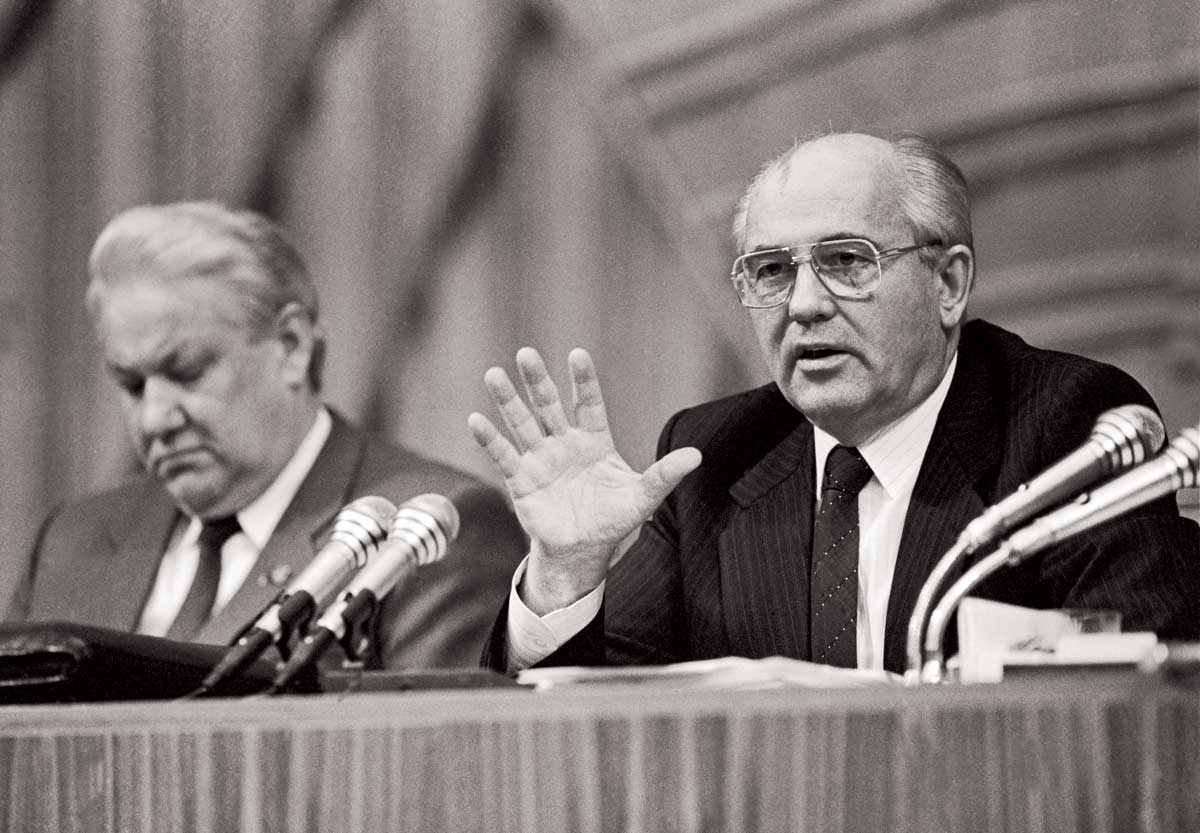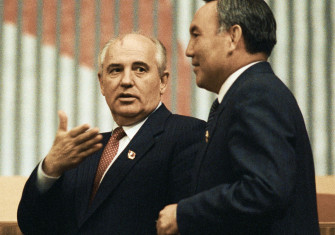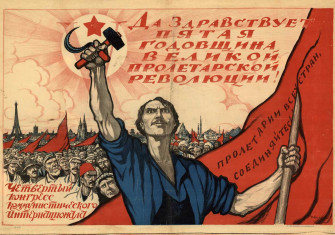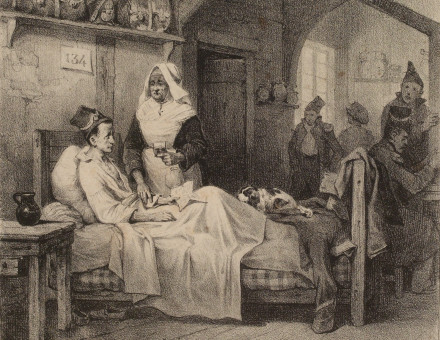Can’t Go On
Mikhail Gorbachev, the last leader of the Soviet Union, had aimed to bring new life to a system in which he believed until the last.

‘We just cannot go on living like this’, Mikhail Gorbachev tells his wife, Raisa, on the eve of his nomination as Soviet leader. Nor did they. Gorbachev was to be the last leader of the Soviet Union. Instead of solving the moribund Marxist-Leninist system’s many problems, the reforms Gorbachev initiated ended in its downfall – or collapse, to borrow the title of Vladislav Zubok’s insight-filled and engaging new history of the end of Soviet power.
Such an outcome was never Gorbachev’s intention. He aimed instead to bring new life to a system in which he seems to have believed until the last. After coming to power in 1985, Zubok tells us: ‘For the next five years, Gorbachev would invoke Lenin’s name constantly.’ It was not the system that was wrong, Gorbachev apparently believed, but a ‘glitch’ in its design that had led to ‘tyranny and mass murder’. An aide remembers volumes of Lenin’s work on Gorbachev’s desk, from which Gorbachev would read aloud and compare what he found there with ‘the present situation’. The last Soviet leader comes across as a religious devotee searching sacred texts for solutions to contemporary secular challenges.
Alas, in Gorbachev’s case, this was not adequate reading material. Zubok persuasively argues that Gorbachev ‘willingly overlooked history lessons apparent to those who had read widely on world and Russian history’. Perhaps more serious is the charge of ignorance of the way the Soviet economy worked, especially given that its system of a cashless economy functioning between state enterprises, alongside the notes and coins used for wages and shopping, was, Zubok writes, ‘not an easy matter for a novice’. In 1990, as the Soviet Union hurtled towards its final crisis, ‘Gorbachev did not understand’ the plans advanced by an official from the Soviet Ministry of Finance.
As the reform process led not to the creation of a gentler, more democratic form of socialism, but to economic chaos, rising nationalism in the subject republics of the Soviet Union and open challenges to the state’s central authority, ‘Gorbachev completely denied the possibility that people from his government were capable of acting on their own and against him’. He was wrong. While he was on holiday, a group of hardline communists from within the political and military elite seized power. Their brief reign lasted only a matter of days. They were undone partly by the risky and courageous personal stand taken by Boris Yeltsin – then newly elected president of Russia (a post he was building up as a rival power base to central Soviet authority) – and completely by their own incompetence and lack of resolve.
Their coup failed to follow even the most basic procedures for the consolidation of power. To begin with, ‘instead of using TV to spread massive and aggressive propaganda’, the plotters aired pre-recorded, censored news bulletins and the ballet Swan Lake. International media were subject to almost no restrictions. Gorbachev was even able to follow events from the holiday villa that had become his prison by listening to the BBC and other western radio stations. More seriously, the coup leaders were just not tough enough. Here Zubok singles out the KGB chief, Vladimir Kryuchkov, who, the author argues, ‘knew the requirements for a successful coup, but he simply lacked the guts to implement them’.
The plotters and Gorbachev failed to get what they wanted. The conspirators may have had a different vision of what the USSR should be, but, like the leader they tried to depose, they wanted it to continue to exist. Instead, the consequence of the coup was ‘the political death of the Soviet Union’.
In name at least, the Soviet Union stumbled on for a few months. After its downfall, Yeltsin – willing to act, while others dithered – ended up in the Kremlin. Russia’s first post-Soviet president does not come off well from this account of the demise of the system from which he, like almost all the other protagonists, had emerged. An unpredictable populist drunkard, Yeltsin would later show none of the reluctance to use violence that apparently held back his adversaries in 1991. In 1993 – facing a political crisis of his own – he sent tanks against the ‘White House’, as the building that had been the focus of his opposition to the coup was popularly known. Fires started during the attack left the upper floors of this central Moscow landmark looking like dark decay on a tooth.
So who, apart from Yeltsin, got what they wanted? Not the people of the Soviet Union themselves, it seems. As this is largely a history of the deeds of decision makers, there is little sense of the view from the vodka queue (Gorbachev’s attempts to tackle the problem of excessive drinking were a factor in his eventual unpopularity with ordinary workers). Zubok does point out, though, that in March 1991 only about 20 per cent of people in the core republics of the Soviet Union thought it would be better to live separately than in a common state – yet that was what happened by the end of the year. The West’s position – and actors in this very Russian political drama frequently seek the view and approval of their erstwhile Cold War foes in Washington – is less straightforward. President George H.W. Bush and his cabinet ‘debated whether a weak Soviet Union or its break-up would best serve American interests’. An account of how all this looked from inside the US government is one of this book’s many strengths.
Zubok concludes that ‘the ghost of the disappeared Soviet Union does not stalk Europe, Asia, and the world’. Yet the way that it happened does have consequences. One can argue whether the eastward expansion of NATO after 1991 was a wise policy or not. It is harder to disagree that the current Russian president, Vladimir Putin, has made ample political use of this in his construction of an authoritarian state.
Such a huge event in world history as the collapse of the Soviet Union will undoubtedly be retold. When it is, Zubok’s impressive book will have to be consulted.
Collapse: The Fall of the Soviet Union
Vladislav M. Zubok
Yale University Press 560pp £25
Buy from bookshop.org (affiliate link)
James Rodgers is the author of Assignment Moscow: Reporting on Russia from Lenin to Putin (I.B. Tauris, 2020) and a former BBC Moscow correspondent.






